- Home
- Jack Gantos
Dead End in Norvelt Page 12
Dead End in Norvelt Read online
Page 12
“Cavewoman,” I said, correcting her.
“Who is a cavewoman?” Dad said loudly as he came around the corner of the barn and into the pony pen. He was carrying a plain brown package under his arm.
Mom pointed at Dad and gave me a knowing look. “He’s definitely a caveman,” she whispered.
“Happy birthday, son,” he said, and tousled my hair.
I smiled, until Mom gave me that serious look that meant she needed to educate me about something before I was allowed to have fun. “Now that you have turned twelve,” she started, “I know you’ll appreciate what I have to say about birthday gifts and gift giving. My mother taught me this and it is the old Norvelt way.”
I dared to glance at Dad for a moment and could tell he was not about to interrupt her.
“We always got three gifts,” Mom explained. “They were good, better, and best. A good gift was always something useful, so your dad and I each got you something useful.”
At that moment Dad scooted outside the pony pen and grabbed something out of sight, and when he returned he handed me a new round-nosed shovel with a nice blue bow tied around the handle. And before I could squawk he also gave me the package that was wrapped up in brown butcher paper.
“Open it,” Mom allowed, with a beaming look across her face. Right away I knew it could not be fun.
I was right. I ripped off the wrapping paper and inside a box were a set of three cotton dish towels hand-stitched with my name on them.
“Don’t worry,” Mom said quickly before I could blurt out some complaint. “These are the good, useful gifts. The more you use them and pitch in around the house the more you can understand how the whole family works as a team.”
“That is a gift?” I asked, incredulous.
“Don’t be an ingrate,” she said playfully. “There is still the better gift to come.”
That was hopeful news and so I waited for the better gift to be revealed, but it was a gift I couldn’t even see!
“The better gift is basically a good deed you do for free,” Dad said.
“Or,” Mom said in her upbeat voice despite the melted smile on my face, “it’s a deed you do because helping others makes you a better person. Your dad and I thought you should volunteer this fall at the Frick Hospital in Mount Pleasant. You’ve been doing a lot of reading and we signed you up to go to the hospital to read to patients who can’t read for themselves. You were born in that hospital and everyone took such good care of us, so this is a way of saying ‘thank you’ to them and the community.”
“Okay,” I said. I knew it was a good deed to read to sick people, but there was still nothing wrong with wanting a real gift just for me.
“And now,” Dad announced, “here comes the best gift—the gift that we think fits you best.”
I was sure it was going to be a pair of underpants or socks or T-shirts that just happened to fit me best.
But then Dad reached into his back pocket and pulled out the smallest white envelope I had ever seen. It was about the size of a matchbox and it fit in the palm of his hand.
“It’s all yours,” he said with much fanfare, and bowed deeply as if I were the emperor of China.
“So what do you think is in there?” Mom gushed as I held it by the corner and waved it back and forth like a tiny white flag. “Take a guess.”
I wanted to say, “I surrender.” But mostly I wanted to guess the right gift because it would make Mom very happy to know that she made me happy.
“Well?” she asked. “Cat got your tongue?”
“Come on, son,” Dad chimed in. “Take a wild shot at it.”
But I didn’t know what to say because my mind was screaming, I hope it’s a car, car, car! And then it came to me in a flash. “A ticket to the Viking Drive-in!” I shouted.
Her smile flattened. “Good guess,” she said without much promise. “Now open it.”
I ripped the envelope down the side and gave it a shake. Three thin handmade tickets slid into my palm. I looked down at them. The first one read: GET OUT OF JAIL FREE. Before I could say anything she explained, “It’s a pass to get out of your room for a day,” she said. “An un-grounded ticket.”
“Like, for twenty-four hours?” I asked.
“Yes,” she confirmed.
“That’s great!” I shouted, and my cheeks swelled up so much they blocked my vision, but in my mind I could see myself running free all over Norvelt.
I paused for a moment, then looked down at the other two tickets. One read: ONE FLIGHT IN THE J-3.
Mom suddenly shot Dad a dirty-bird look. “I thought we agreed you were going to give him a ticket to the carnival so he could go on the rides,” Mom said.
“I figured the J-3 would be a better ride than some old Ferris wheel,” Dad replied, and looked away from Mom and toward me. “Right, son?”
“Right, Dad,” I snapped back.
“But I fly it,” Dad confirmed. “And I’ll give you a few tips.”
The way he said tips made me think he had some fun on his mind that he couldn’t tell me about in front of Mom, who was not looking real happy.
The last ticket read: DOUBLE FEATURE AT VIKING DRIVE-IN.
“I guessed it!” I said, grinning. “I really did!”
“Of course you did,” Mom said, and leaned forward for a kiss. “You stare at that tiny screen so much I fear you’ll ruin your eyes. But keep in mind that I had to barter for the drive-in ticket. You can see the movies for free, but when they are over you have to stay behind and pick up all the trash that people throw out their windows.”
I couldn’t tell if she was joking or not. “Really?” I asked in a small voice. “Do I have to pick up trash for my birthday gift?”
“Just kidding,” she said. “I tried to barter your work for the ticket but then they reminded me about the child labor laws. Darn! So your dad and I thought we’d better start you off with an allowance before Mr. Spizz caught you working around the house and put us in jail.”
Dad pulled out a two-dollar bill and set it right in the middle of my hand. “You do a lot of work around here, so you deserve some reward,” he said.
“Wow,” I said, and I stared wide-eyed. I had never seen a two-dollar bill before and now I knew that President Jefferson was on the front side.
“Hey,” Dad said, “I hate to break this party up, but Miss Volker called a little while ago and said she needs a ride to her church. Jackie, can you drive her?”
“Sure,” I said. Normally I walked down the hill to the Norvelt Church of Christ with Mom and Dad. But getting to drive Miss Volker was as good as a birthday gift, because her small Catholic church was out in the country and must have been about a half-hour trip.
Mom stepped out of the pony pen and looked up into the air. She could judge time from the range of blue shades across the sky. “You better wash up,” she advised. “You have to be there in a half hour and you smell like kerosene. If they light candles you’ll go up in flames.”
“Then we’ll have holy smoke,” I said, and was in such a good mood I laughed at my own joke. “And thanks for the great gifts,” I added, and then ran off to get ready.
It didn’t take me long to wash up and Mom had already laid out all my clothes, so I was dressed and running down to Miss Volker’s house in no time. I opened her porch door and she was waiting for me with her back turned.
“Can you button up my dress?” she asked. “I’m gettin’ to the point where I’m just going to wear a bathrobe everywhere. Buttons, zippers, hooks and eyes—I just can’t do them anymore.”
“That’s why you have me for your boyfriend,” I said, and I buttoned her up in a jiffy.
“I think you are more pet than boyfriend,” she cracked, “which is good. At my age a pet is all I need.”
I got her into the car and then ran around to the other side and started it up. We were no sooner out of Norvelt than she said, “You know I can’t write.”
“I know,” I replied.
&nb
sp; “But if I could write here is what I’d put down onto paper. I want you to have this fine little car,” she said.
I almost drove off the road and into a mailbox. “Really?” I said, and gently patted the steering wheel like it was my tender new baby.
“Don’t get too excited,” she continued. “You can’t have it until I’m dead.”
“But I’d rather have you alive than the car,” I said.
“That’s sweet of you,” she said without much sweetness. “But you’ll find the car will be more useful. And I have a bit of birthday advice to give you.”
“What’s that?” I asked.
She pointed at my nose. “I hope you aren’t still taking all those iron drops,” she said gravely.
“I am,” I said. “Mom makes me take spoonfuls of the stuff.”
“Well, pour it down the drain,” she ordered. “Immediately! I did some research on your nose. There is a disease called hemochromatosis, which you get from having too much iron in your blood! It destroys your liver and pancreas and causes severe depression—guess who had it?”
“No idea,” I said.
“Ernest Hemingway!” she hollered out. “The great American writer who shot himself last summer with a loaded rifle!”
“Was it an accident?” I asked, thinking of my own little accident.
“No,” she said matter-of-factly. “Suicide.”
That was a totally depressing birthday warning. I was wondering how I could keep Mom from making me take the iron drops and I started driving so slowly that Mr. Spizz passed us on his tricycle and was already inside the church by the time we arrived.
After I very carefully parked the car-which-someday-would-be-mine I escorted Miss Volker to the front door. She had a special “old folks” seat close to the altar and strolled up the center aisle to take her place. I stayed behind like her chauffeur, and sat in the back pew. From there I could keep an eye on all the grownups who were fidgeting or falling asleep or adjusting their fancy hats or singing off key. But the best part of sitting in the back was that my mind could wander aimlessly, because church was so dreamy. Real life was lived like doing a math problem: one and one always equaled two. But church had a different kind of math. You could never be sure what anything added up to, which meant that what was in your imagination while sitting in a pew was just as important as what the preacher was saying—maybe even more important. It’s like when you read a book and you know that the words are important, but the images blossoming in your imagination are even more important because it’s your mind that allows the words to come to life.
Because I had gotten a bunch of nosebleeds in church, I spent a lot of time sitting in the pew with my head thrown all the way back and my eyes looking straight up at the brilliant white ceiling, which was sort of like God’s movie screen where I could imagine what heaven might look like.
For me, heaven mostly looked like the pictures in the Landmark book I read about Julius Caesar in ancient Rome. Everyone wore colorful robes and drove around in chariots and lived in massive stone buildings with tall columns and statues of famous leaders and generals and thinkers. The noon sun was always parting the clouds to show off a robin’s-egg-blue sky and people didn’t so much walk as they drifted just an inch above the all-white stone paths and roads, and they never went the wrong way because in heaven everything you did was always the right way and everything ended the way it should. For some reason the only food in heaven was bread, but the bread came in every shape you can imagine. There were tiny loaves for dolls, and warm dinner rolls, and long French bread, and braided rings of bread, and thick loaves as big and round as wagon wheels, and even entire wheat-colored cottages of crusty bread which when you lived in them were more like yeasty caves in a gigantic mountain of bread, and all you had to do in order to feed yourself in heaven was pull a hank of soft, moist bread right out of the wall. And there was never such a thing as a “last supper” because every night while you slept your bread house was made fresh all over again, and as my mother always said, if you had fresh bread each day then you’d never have a worry. And not having a worry in the world was the definition of heaven. Dad said that he wanted to move to Florida where he could buy a little piece of heaven, and Mom had said Norvelt was heaven on earth. I guess for me heaven was everything good I could imagine. It was always so beautiful to stare up at that white ceiling and imagine only clean beautiful places, where the reward for living a pure life was a great loaf of warm bread.
But then, when church was over, everything in my imagination seemed to collapse into the dust of a lost world that on the following Sunday I would have to mix up with some live yeast and bake into another vision of heaven.
14
That night my birthday celebration continued. Mom, Dad, and I had cake and ice cream and played Monopoly, which Dad declared was the greatest game ever invented. “It is the American dream in a box,” he said, pleased with his tidy summation.
Mom disagreed. “It teaches you how to ruin other people’s lives without caring,” she countered. She owned the low-rent properties—Baltic and Mediterranean. I owned the railroads, the utilities, and the orange properties. Dad owned the red, yellow, and green properties and had them loaded up with hotels just waiting to bankrupt us out of the game. The rest of the properties were split unevenly among us.
Mom and I teamed up on a handshake and gave each other free rent. Still, it didn’t take long for Dad to own us both. He didn’t gloat, but he grinned and sang one of his favorite songs about hard work. “You load sixteen tons, what do you get? Another day older and deeper in debt.” Then he carefully packed up the game, as if he were packing up the town and getting ready to hit the road before he got older and deeper in debt.
* * *
Sometime after I went to bed I heard the motorcycles swarm up over the hill and down toward the center of Norvelt. I could tell they were not returning to the Huffer Funeral Parlor but to some other place a little farther out. They had to have awakened everyone as they downshifted loudly, and even at a distance their roaring engines rattled our windows. I didn’t know why they came back but I knew it couldn’t be good. They didn’t stay long, however, and it seemed like only a few minutes passed before I heard them rev their engines and come growling back up the hill and branch off toward the road to Mount Pleasant, where the first Hells Angel had danced in from.
Maybe they were lost, I guessed. But that was just wishful thinking. I should have remembered the plague they brought, because I had almost fallen back to sleep when the stabbing whistle of the volunteer fire department went off. I jumped out of bed and ran to the hallway just as Mom and Dad dashed out of their doorway. It was if we were on the Titanic. We all went into the living room. Mom pulled the curtains to either side of the windows. I half expected to see waves and fish and icebergs. But immediately we could see the fire beyond the Community Center.
“It has to be a house in section D,” Dad announced, and he doubled back to his room. In a few moments he came out in his work clothes.
He gave Mom a quick kiss.
“Be careful,” she said as he went out the front door. I heard his boot steps quicken as he tramped down the front porch. In a moment we saw the headlights swing by the windows as he turned his truck around, shifted into first gear, and headed off to join the other volunteers to help put out the fire.
Mom and I were both nervous and kept staring blankly out the window. From our distance we couldn’t make out any telling details, other than that the fire seemed to grow.
Suddenly, Mom turned to me as she remembered. “Go get me those Japanese binoculars,” she ordered, and gave me a little shove toward the back door. “Hurry! But don’t you dare touch the rifle.”
“Of course I won’t,” I cried out. “I’m not a suicidal maniac.”
I grabbed the flashlight from under the kitchen sink and turned it on just as I started down the back porch steps. The air was thick with humid summer heat which seemed to rise off the grass like
steam. The paving stones under my bare feet were warm and smooth as I leaped from one to the other, silently counting them like Monopoly spaces all the way to the garage. Dad had left the door unlocked and half open. I slipped inside and in one motion pulled the hanging string switch for the overhead light as I trotted around the sleeping J-3 and over to the chest where the souvenirs were kept. I lifted the lid and leaned it back against the garage wall. The rifle was wrapped up in the Japanese flag, right on top where Dad always kept it. I could just see the dark barrel poking out from the white silk of the flag. I swung the flashlight and could make out the shining lenses of the binoculars in the far corner of the chest. I quickly grabbed them then reversed my steps back to the kitchen.
“Let me have them first,” Mom said urgently, and took the binoculars from my hand. She stood at the kitchen window and held them up to her eyes as if she were the captain on the bridge of a battleship.
“What do you see?” I asked anxiously.
“The whole house … is on fire,” she replied slowly as she concentrated on what she saw through the lens. “And the garage too.”
“Whose house?” I asked. Mertie-Jo lived in that direction, along with a couple other kids I knew from school.
“Miss Volker’s sister’s old house,” she said.
“But Miss Volker sold it,” I replied. “To some young guy.”
Mom lowered the binoculars and gave me a very serious look. “She sold it,” Mom said grimly, “not to some ‘nice young guy’ but to the Hells Angel who was hit by the cement truck. It turns out he was dancing his drunken jig to his new home when he was run over.”
“That’s interesting,” I said, wide-eyed. “Real interesting. Because Bunny told me that when the Hells Angels showed up to take his body away they were really angry.”
“I saw Mrs. Huffer on the way to the pants factory and she was worried,” Mom added. “She said they swore they would return for revenge.”
“Did you hear the motorcycles tonight?” I asked.
“That had to be them,” she agreed. “I bet they returned to set the house on fire.”

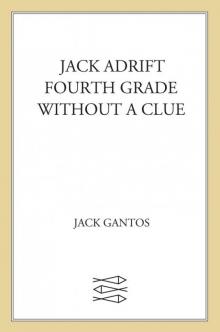 Jack Adrift
Jack Adrift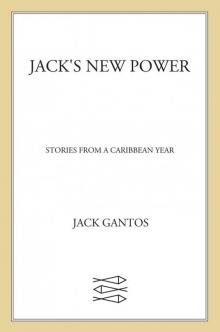 Jack's New Power
Jack's New Power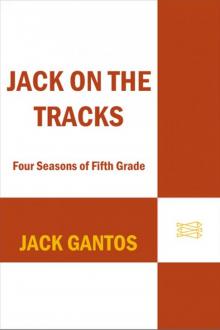 Jack on the Tracks
Jack on the Tracks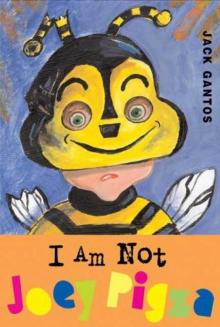 I Am Not Joey Pigza
I Am Not Joey Pigza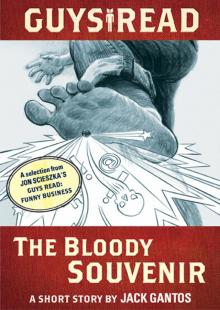 The Bloody Souvenir
The Bloody Souvenir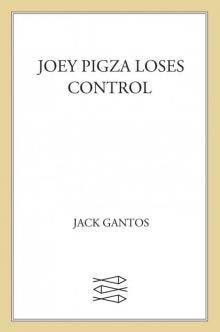 Joey Pigza Loses Control
Joey Pigza Loses Control Heads or Tails
Heads or Tails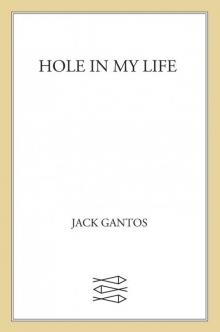 Hole in My Life
Hole in My Life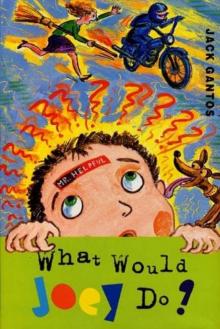 What Would Joey Do?
What Would Joey Do?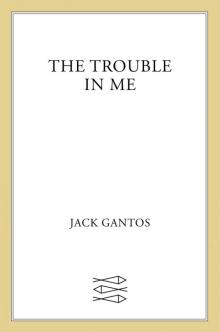 The Trouble in Me
The Trouble in Me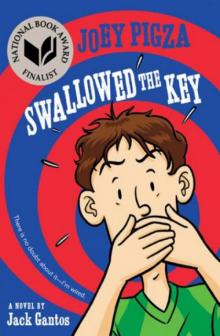 Joey Pigza Swallowed the Key
Joey Pigza Swallowed the Key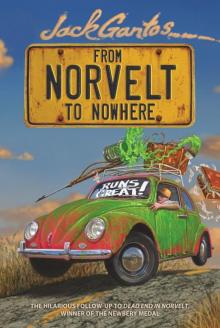 From Norvelt to Nowhere (Norvelt Series)
From Norvelt to Nowhere (Norvelt Series)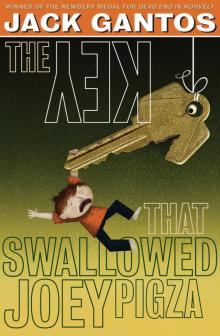 The Key That Swallowed Joey Pigza
The Key That Swallowed Joey Pigza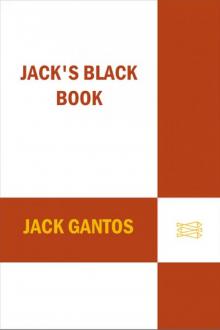 Jack's Black Book
Jack's Black Book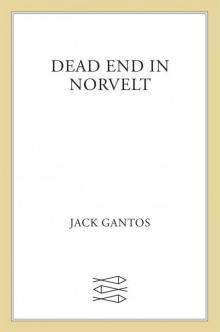 Dead End in Norvelt
Dead End in Norvelt